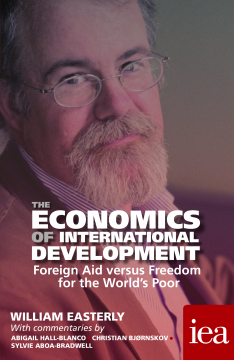
BOOK
The Economics of International Development: Foreign Aid versus Freedom for the World's Poor
William Easterly | Sylvie Aboa-Bradwell | Christian Bjørnskov | Abigail Hall-Blanco
(2016)
Additional Information
Book Details
Abstract
Foreign aid and overseas military intervention have been important and controversial political topics for over a decade. The government’s controversial target to spend 0.7 per cent of national income on foreign aid has been widely welcomed by some, but strongly criticised by others. Furthermore, the controversy of the Iraq war rumbles on, even today. This is all happening amongst much instability in many parts of the world. In this short book, a number of authors challenge the assumption that we can bring about economic development and promote liberal democracies through direct foreign intervention – whether economic or military intervention. The lead author, William Easterly, drawing on his wide experience at the World Bank and as an academic, is a renowned sceptic of intervention. He points out that solutions proposed now to the problem of poverty are identical to solutions proposed decades ago – but the plans of rich governments simply do not successfully transform poor countries. Academics Abigail Hall-Blanco and Christian Bjornskov add further context and put forward empirical evidence that backs up Easterly’s argument. Syvlie Aboa-Bradwell draws upon her own practical experience to give examples of how people in poor countries can be assisted to promote their own development. This book is essential reading for students, teachers and all interested in better understanding how to help – and how not to help – the world’s most disadvantaged peoples.
Table of Contents
| Section Title | Page | Action | Price |
|---|---|---|---|
| Table 1\tTechnocratic solutions to poverty 1938 and 2005 | 7 | ||
| Figure 1\tNumber of African leaders by type | 13 | ||
| Figure 2\tDevelopment in Botswana, Zambia and Zimbabwe relative to the US | 57 | ||
| The authors | viii | ||
| Foreword | xi | ||
| Acknowledgements | xvii | ||
| Summary | xviii | ||
| Tables and figures | xxi | ||
| 1\tThe tyranny of experts: foreign aid versus freedom for the world’s poor | 1 | ||
| William Easterly | 1 | ||
| Technocrats and the failure of development policy | 1 | ||
| The importance of ‘rights’ | 7 | ||
| Making progress on economic freedom and political rights | 11 | ||
| What should we do to end poverty? | 15 | ||
| 2\tQuestions and discussion | 17 | ||
| 3\tWilliam Easterly’s political economy of intervention | 34 | ||
| A commentary on William Easterly’s lecture | 34 | ||
| Abigail R. Hall-Blanco | 34 | ||
| Introduction | 34 | ||
| Hayek, the knowledge problem and economic calculation | 37 | ||
| Buchanan, public choice and development | 42 | ||
| Easterly’s critique and the example of military intervention | 45 | ||
| Conclusion | 48 | ||
| References | 50 | ||
| 4\tEasterly’s challenge to the development community | 55 | ||
| A commentary on William Easterly’s lecture | 55 | ||
| Christian Bjørnskov | 55 | ||
| Introduction | 55 | ||
| A background for the critique | 56 | ||
| Easterly’s main argument | 60 | ||
| What is missing in Easterly’s argument? | 64 | ||
| Which way next? | 68 | ||
| References | 70 | ||
| 5\tEntrepreneurship, social engagement and African development in the twenty-first century | 73 | ||
| A commentary on William Easterly’s lecture | 73 | ||
| Sylvie Aboa-Bradwell | 73 | ||
| Introduction | 73 | ||
| Background and vision | 77 | ||
| Challenges | 80 | ||
| Achievements | 82 | ||
| Lessons and recommendations | 84 | ||
| Conclusion | 86 | ||
| References | 88 | ||
| About the IEA | 90 |
